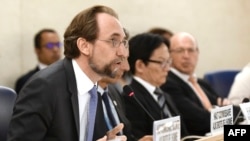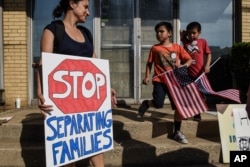U.N. High Commissioner for Human Rights Zeid Ra’ad Al Hussein warns the rise of extreme nationalism is threatening global peace and security. Zeid spoke at the opening of the U.N. Human Rights Council’s three-week session in Geneva.
Delegates attending the U.N. Human Rights Council’s 38th session gave Zeid Ra’ad Al Hussein a standing ovation as he finished his last speech before he leaves his post at the end of August.
The end of his mandate seemingly freed the rights chief to be even more outspoken than usual.
Zeid particularly deplored the rise of extreme nationalism promoted by what he described as self-serving, callous leaders.
“Only by pursuing the opposite to nationalism - only when states all work for each other, for everyone, for all people, for the human rights of all people - can peace be attainable…. For only by speaking out can we begin to combat the growing menace of chauvinistic nationalism that stalks our future.”
Zeid expressed deep concern about recently adopted migration policies by the United States in which children are forcibly separated from parents who cross into the U.S. illegally. He said the policies punish children for their parents' actions.
“The American Association of Pediatrics has called this cruel practice government-sanctioned child abuse, which may cause irreparable harm, with lifelong consequences. The thought that any state would seek to deter parents by inflicting such abuse on children is unconscionable,” Zeid said.
The high commissioner condemned human rights abuses by the governments of Syria, Myanmar, Venezuela and Nicaragua, and singled out the human rights situations of several African countries, including Burundi, Cameroon, Egypt, and Rwanda.
He expressed deep concern about South Sudan, where a pattern of rapes and killings by government forces in Unity State has been taking place since April.
“Human rights officers have documented the rape of children as young as four years old, and numerous cases of women, elderly people and others being hanged or burned alive in what appears to be a deliberate scorched-earth policy.”
Zeid also criticized Israeli violations in the occupied Palestinian territories. The United States reportedly is planning to quit the council because of what it sees as bias against Israel.
British Foreign Secretary Boris Johnson, who also addressed the session, agreed with this U.S. assessment.
“We share the view that a dedicated agenda item focused solely on Israel and the occupied Palestinian territories is disproportionate and damaging to the cause of peace and unless things change, we shall move next year to vote against all resolutions introduced under Item 7,” Johnson said.
Agenda Item 7 is a permanent fixture on the council's agenda, dealing with Israel and the occupied Palestinian territories.
Johnson then switched to the main focus of his speech, which was to urge all countries to promote girls’ education as the best way of achieving sustainable development.
He called it a disgrace that 130 million girls worldwide do not get an education and denounced fanatics who fight to stop girls from going to school.
“A group of numbskulls called Boko Haram, who raid schools, abduct children, inflict any atrocity in order to deny girls an education.… When I visited Borno State last year, I met girls who had been told they would be shot if they dared learn to read as the Taliban shot Malala,” he said.
Johnson was referring to the attempted assassination in 2012 of Pakistan's Malala Yousafzai, who had been advocating for the rights of girls to have an education.





